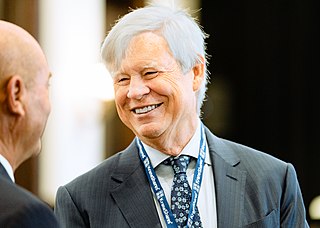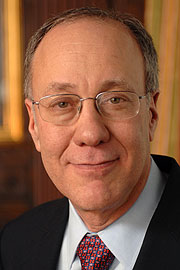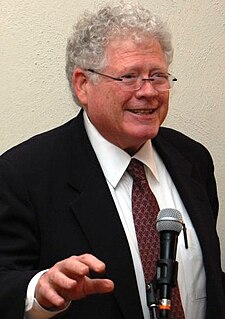
Robert Fry Engle III is an American economist and statistician. He won the 2003 Nobel Memorial Prize in Economic Sciences, sharing the award with Clive Granger, "for methods of analyzing economic time series with time-varying volatility (ARCH)".

Michio Morishima was a Japanese heterodox economist and public intellectual who was the Sir John Hicks Professor of Economics at the London School of Economics from 1970–88. He was also professor at Osaka University and member of the British Academy. In 1976 he won the Order of Culture.
Stanley Eugene Zin is a Canadian economist. He is the William R. Berkley Professor Economics and Business at the Leonard N. Stern School of Business, New York University.
James Darrell Duffie is a Canadian financial economist and is Dean Witter Distinguished Professor of Finance at Stanford Graduate School of Business.

Lars Peter Hansen is an American economist. He is the David Rockefeller Distinguished Service Professor of economics at the University of Chicago and a 2013 recipient of the Nobel Memorial Prize in Economics.
The Frisch Medal is an award in economics given by the Econometric Society. It is awarded every two years for empirical or theoretical applied research published in Econometrica during the previous five years. The award was named in honor of Ragnar Frisch, first co-recipient of the Nobel prize in economics and editor of Econometrica from 1933 to 1954. In the opinion of Rich Jensen, Gilbert F. Schaefer Professor of Economics and chairperson of the Department of Economics of the University of Notre Dame, "The Frisch medal is not only one of the top three prizes in the field of economics, but also the most prestigious 'best article' award in the profession". Five Frisch medal winners have also won the Nobel Prize.
In economics, Epstein–Zin preferences refers to a specification of recursive utility.
Pradeep Dubey is an Indian game theorist. He is Professor of Economics at State University of New York, Stony Brook and a member of the Stony Brook Center for Game Theory. He also holds a visiting position at Cowles Foundation, Yale University. He did his schooling at the St. Columba's School, Delhi. He received his Ph.D. in applied mathematics from Cornell University and B.Sc. from the University of Delhi. His research areas of interest are game theory and mathematical economics. He has published, among others, in Econometrica, Games and Economic Behavior, Journal of Economic Theory and Quarterly Journal of Economics. He is a Fellow of The Econometric Society and a member of the council of the Game Theory Society.

Roger Bruce Myerson is an American economist and professor at the University of Chicago. He holds the title of the David L. Pearson Distinguished Service Professor of Global Conflict Studies at The Pearson Institute for the Study and Resolution of Global Conflicts in the Harris School of Public Policy, the Griffin Department of Economics, and the college. Previously, he held the title The Glen A. Lloyd Distinguished Service Professor of Economics. In 2007, he was the winner of the Sveriges Riksbank Prize in Economic Sciences in Memory of Alfred Nobel with Leonid Hurwicz and Eric Maskin for "having laid the foundations of mechanism design theory." He was elected a Member of the American Philosophical Society in 2019.

Griffith Conrad Evans was a mathematician working for much of his career at the University of California, Berkeley. He is largely credited with elevating Berkeley's mathematics department to a top-tier research department, having recruited many notable mathematicians in the 1930s and 1940s.
Jacques H. Drèze was a Belgian economist noted for his contributions to economic theory, econometrics, and economic policy as well as for his leadership in the economics profession. Drèze was the first President of the European Economic Association in 1986 and was the President of the Econometric Society in 1970.

Ehud Kalai is a prominent Israeli American game theorist and mathematical economist known for his contributions to the field of game theory and its interface with economics, social choice, computer science and operations research. He was the James J. O’Connor Distinguished Professor of Decision and Game Sciences at Northwestern University, 1975-2017, and currently is a Professor Emeritus of Managerial Economics and Decision Sciences.
Robert Wayne Clower was an American economist. He is credited with having largely created the field of stock-flow analysis in economics and with seminal works on the microfoundations of monetary theory and macroeconomics.
John Geanakoplos is an American economist, and the current James Tobin Professor of Economics at Yale University.
Charles Frederick Roos was an American economist who made contributions to mathematical economics. He was one of the founders of the Econometric Society together with American economist Irving Fisher and Norwegian economist Ragnar Frisch in 1930. He served as Secretary-Treasurer during the first year of the Society and was elected as President in 1948. He was director of research of the Cowles Commission from September 1934 to January 1937.
Felix Kübler is a German economist who currently works as Professor of Financial Economics at the University of Zurich. His research interests include computational economics, general equilibrium theory and portfolio choice. In 2012, he was awarded the Gossen Prize in recognition of his contributions to economic research.
Chew Soo Hong is a Singaporean economist who is Professor at the National University of Singapore and an adjunct professor at the Hong Kong University of Science and Technology. He is considered one of the pioneers in axiomatic non-expected utility models.
Edi Karni is an Israeli born American economist and decision theorist. Karni is the Scott and Barbara Black Professor of Economics at Johns Hopkins University. He is a Fellow of the Econometric Society and an Economic Theory Fellow of the Society for the Advancement of Economic Theory.
Arthur J. Robson is a New Zealand economist whose research interests include game theory and the biological evolution of economic behaviour. In the period between 2003 and 2017, Robson held a Canada Research Chair in Economic Theory and Evolution at Simon Fraser University, where he has been a University Professor since 2017.
Joel Sobel is an American economist and currently professor of economics at the University of California, San Diego. His research focuses on game theory and has been seminal in the field of strategic communication in economic games. His work with Vincent Crawford established the game-theoretic concept of cheap talk.










